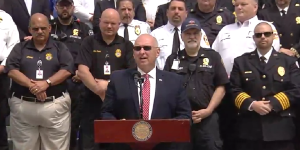PA State Representative Martin Causer continues to advocate for EMS services
A shortage of funding and new recruits is putting the state’s entire emergency response system – as well as the citizens who rely upon it – in jeopardy. That was the overriding message from testimony presented Wednesday to the House Majority Policy Committee, which is chaired by Rep. Martin Causer (R-Cameron/McKean/Potter).
“From emergency medical services to law enforcement to firefighting, we are facing some significant challenges in ensuring help is available when citizens call 9-1-1,” Causer said. “Despite efforts we have made in the Legislature to increase reimbursements to EMS companies, enhance grant programs for EMS and fire companies, and support state and local police with additional funding, we are facing a crisis situation. We must come together as a Commonwealth to support our emergency responders and our communities.”
The hearing opened with testimony from Mike Stangroom, director of operations for Rostraver West Newton Emergency Services, who warned of the ongoing decline in the number of emergency medical responders and rising costs for things like fuel and equipment.
“There’s not an EMS organization in this state that is not struggling in all phases of EMS,” said Stangroom. “We are under this false pretense that when you dial 9-1-1 you’re going to get qualified personnel to your scene in a reasonable amount of time, and it’s not true anymore. It’s not true anymore.”
The committee then heard from two long-time law enforcement officers about the extreme challenges of police work in today’s society. As a result, recruiting has become increasingly difficult.
Ronald Zona, chief of the Westmoreland County Detective Bureau and a retired state trooper, said there is no end in sight to the depletion of manpower. “The bottom line is we need to find ways to better recruit and retain officers. We need to make a career in law enforcement appealing again. We need to offer some incentive to join this dangerous profession. We need to pay our officers well and provide good retirement benefits,” he said.
The hearing closed with a panel of firefighters who report they too face rising equipment costs and a decline in the number of people serving their fire companies and communities.
While acknowledging there is no one-size-fits-all approach to recruitment and retention, Cory Snyder, a firefighter with the Mount Pleasant Volunteer Fire Department, noted that incentives may work for some, but they don’t address the concerns he usually hears from potential members.
“When we interview a candidate for the organization and tell them all the fundraising they are required to participate in, they are shocked,” he said. “Young people have families, children and work obligations. Older adults may not have the desire to complete the training necessary to be a firefighter.”
Snyder offered several suggestions to make training more attainable, such as treating volunteer firefighters the way they treat the National Guard with paid time off work for training and tax cred its to their employers.
While fire companies need more direct funding, lawmakers could also help by making permanent their ability to conduct online fundraising, an activity they were not permitted to pursue by law until a waiver was issued during the COVID-19 pandemic, said Brian Sokol, president of the Rostraver Central Fire Company. He explained it takes fewer manhours to run an online fundraiser and often yields the same or greater results.
“This was a very important and informative hearing,” Causer said. “I appreciate the service of all emergency responders, and I am grateful to those who took the time today to share their concerns and ideas to address them with the committee today. While we have made some progress on many of these issues, there is clearly more work to be done.”
Among recent actions by the General Assembly to support emergency response in the Commonwealth:
- State budget includes funding to support two new cadet classes to put 200 additional state troopers out in communities, as well as funding for mobile video and body cameras.
- State budget also allots $135 million in one-time federal funds to provide local law enforcement support grants.
- State budget increases Medicaid reimbursement rates to EMS companies for basic life support and advanced life support services, as well as mileage.
- Long-time Fire Company and Emergency Services Grant Program provided supplemental funding to award an extra round of grants to offset rising costs and diminished fundraising due to COVID-19.
- State law permits local government to provide tax incentives to volunteer emergency responders.
To view video of the hearing or read submitted testimony, visit www.PAGOPPolicy.com.







